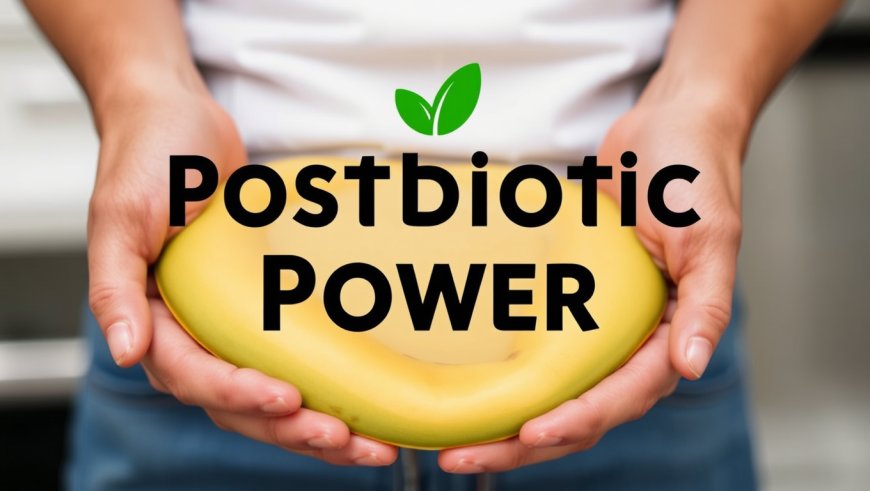Postbiotic Power: The Next Big Thing in Digestive Health?
Postbiotics are the next frontier in gut health, offering powerful benefits without the need for live bacteria. Could they replace probiotics? Find out.

Introduction: The Gut Health Revolution
In recent years, probiotics and prebiotics have dominated the conversation around gut health. But there’s a new player on the scene—postbiotics—and experts believe they could be the most powerful yet.
While probiotics introduce beneficial bacteria into the gut and prebiotics feed those bacteria, postbiotics are the bioactive compounds that result from probiotic activity. These compounds, including short-chain fatty acids, peptides, and enzymes, are emerging as key players in digestive health, immune function, and even metabolic regulation.
Could postbiotics be the missing link for optimal gut health? Let’s explore how they work, their benefits, and whether they’re the future of digestive wellness.
What Are Postbiotics?
Postbiotics are non-living, beneficial compounds produced when probiotics ferment dietary fiber in the gut. Unlike probiotics, which are live microorganisms that need to survive the digestive tract, postbiotics are already active and ready to deliver health benefits.
Key Types of Postbiotics:
- Short-chain fatty acids (SCFAs) – Improve gut barrier function and reduce inflammation.
- Lactate and butyrate – Support gut lining integrity and fuel colon cells.
- Peptides – Have antimicrobial and immune-boosting properties.
- Exopolysaccharides – Help with gut microbiome balance.
? Read more on gut microbiome science: Harvard T.H. Chan School of Public Health
How Postbiotics Benefit Digestive Health
Postbiotics have gained attention because they offer similar benefits to probiotics but without the challenges of maintaining live bacteria in supplements or foods. Here’s how they enhance digestive health:
1. Strengthening the Gut Barrier
A strong gut lining is crucial for preventing leaky gut syndrome, where toxins and bacteria pass into the bloodstream. Postbiotics, particularly butyrate, help tighten gut junctions, reducing inflammation and improving digestion.
? More on gut barrier health: National Institute of Health (NIH)
2. Supporting a Balanced Microbiome
By producing SCFAs and antimicrobial peptides, postbiotics promote a balanced gut microbiome, inhibiting the overgrowth of harmful bacteria such as Clostridium difficile and E. coli.
3. Enhancing Nutrient Absorption
Postbiotics improve the breakdown and absorption of key vitamins and minerals like calcium, magnesium, and vitamin B12, essential for energy production and bone health.
? See how gut health impacts nutrition: Cleveland Clinic
4. Reducing Digestive Discomfort
If you suffer from bloating, IBS, or acid reflux, postbiotics may help. They reduce inflammation and regulate bowel movements, leading to a calmer gut environment.
Postbiotics vs. Probiotics: Which One Is Better?
| Feature | Probiotics | Postbiotics |
|---|---|---|
| Definition | Live bacteria that support gut health | Bioactive compounds produced by probiotics |
| Survivability | Must survive digestion to be effective | Already active and don’t require survival |
| Storage | Requires refrigeration (in some cases) | More stable, longer shelf life |
| Effectiveness | May vary based on gut environment | Consistently effective since they’re the end product |
| Safety | Some people experience bloating or side effects | Generally well-tolerated, no risk of overgrowth |
The biggest advantage of postbiotics is their stability and reliability—since they aren’t live organisms, they don’t require refrigeration and work regardless of a person’s microbiome composition.
? More on probiotics vs. postbiotics: Johns Hopkins Medicine
Other Health Benefits of Postbiotics
1. Boosting Immune Function
Postbiotics have been shown to modulate immune responses, reducing the severity of infections and allergies. Certain peptides and SCFAs help regulate the immune system and prevent excessive inflammation.
? How gut health affects immunity: Mayo Clinic
2. Managing Metabolic Health
Emerging research suggests that postbiotics may play a role in blood sugar regulation and weight management. SCFAs like butyrate improve insulin sensitivity and may help lower blood sugar spikes after meals.
? Read about gut health and metabolism: American Diabetes Association
3. Enhancing Mental Well-Being
The gut-brain axis is real, and postbiotics contribute to serotonin production, reducing symptoms of anxiety and depression. Some studies suggest butyrate may have antidepressant-like effects by influencing brain function.
? Gut-brain connection explained: Harvard Medical School
Are Postbiotic Supplements the Future?
With their powerful benefits and ease of use, postbiotics are now being incorporated into supplements and functional foods. Unlike probiotics, which require careful selection to ensure effectiveness, postbiotics work immediately and are more predictable in their effects.
Best Sources of Natural Postbiotics:
If you’re not ready for supplements, you can still boost postbiotic production by consuming:
✅ Fermented foods (kimchi, sauerkraut, miso)
✅ High-fiber foods (oats, bananas, legumes)
✅ Polyphenol-rich foods (green tea, dark chocolate, berries)
? Learn more about fermented foods: The Journal of Nutrition
Final Verdict: Should You Try Postbiotics?
If you’ve struggled with digestive issues, poor immunity, or metabolic imbalances, postbiotics might be the missing piece in your gut health regimen. They offer:
✅ Stronger gut barrier protection
✅ More stable and effective results than probiotics
✅ Anti-inflammatory and immune-boosting benefits
✅ Potential metabolic and mental health improvements
As more research unfolds, postbiotics could become the new gold standard in digestive wellness. Whether through diet or supplements, incorporating postbiotics into your routine might just be the key to unlocking better health.
? More on gut health advancements: National Institutes of Health
What's Your Reaction?
 Like
0
Like
0
 Dislike
0
Dislike
0
 Love
0
Love
0
 Funny
0
Funny
0
 Angry
0
Angry
0
 Sad
0
Sad
0
 Wow
0
Wow
0



















































